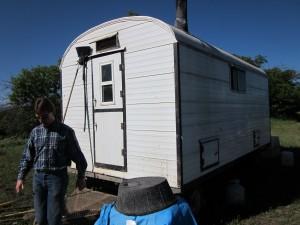Exploitation of legal migrant workers in Colorado
ancher Kip Farmer checks in with one of his Peruvian employees. (Photo by Megan Verlee)
Story by Megan Verlee, Colorado Public Radio, for PRI’s The World. Listen to audio for full report.
Rancher Kip Farmer navigates his truck over rocky dirt roads in the mountains of Western Colorado. Farmer grew up tending his family’s flocks up here, living for weeks at a time in tents and old trailers out on the range. But he’s one of few Americans to have any experience with this work.
“It’s seven days a week, 24 hours a day,” Farmer says. “None of the locals really would want to put in that kind of time and be tied down every day that many hours a day doing a job up away from family and friends.”
So instead, Farmer employs around a dozen Peruvian sheep herders on temporary work visas.
As we come down a steep hill, he runs into one of his men and stops to check in. Farmer tells the worker he’s left a crate of border collie puppies at the man’s trailer, to help tend the flock.
The federal government requires Farmer provide his men with trailers and food, and pay a minimum wage of $750 a month. There’s a stack of white envelopes in the center console of his truck, today is payday.
“When I get back to town today, I’ll probably send four or five different Western Unions back to Peru,” he says. “The ones that have families generally will send $500 or $600 of it home every month.”
Most of Farmer’s herders have worked with him for ages, and Farmer says he doesn’t have any trouble convincing them to renew their visas every three years.
“Employees we have are making a lot more money with us than they would be back home,” Farmer says. “So they’re bringing resources back to their home country that wouldn’t be there otherwise.”
For years, though, immigration rights activists have argued the conditions herders put up with aren’t worth the money they’re paid. They say some ranchers take advantage of their workers, denying them medical care, taking improper deductions from their paychecks, and generally making an already difficult job even more lonely and isolating than it has to be.
Spanish Professor Thomas Acker is one of those fighting for a higher wage and more oversight of working conditions.
“We’re expecting these workers to be treated much more poorly than any American would be treated,” Acker says. “And the only reason it’s going on is because nobody’s looking.”
Acker doesn’t just want the US government to keep a closer eye on the welfare of immigrant sheep herders. He says their home countries haven’t been careful enough about looking out for their citizens.
“What we would also like to see is an agency or an entity, somebody that would be watching out for the workers’ welfare, when they’re signing up for these contracts and making sure they understand what they’re getting into before they come over here,” Acker says.
Read the rest of this story on The World website.
—————————————————————-
PRI’s “The World” is a one-hour, weekday radio news magazine offering a mix of news, features, interviews, and music from around the globe. “The World” is a co-production of the BBC World Service, PRI and WGBH Boston. More about The World.
